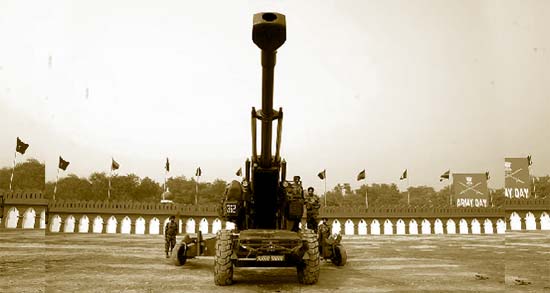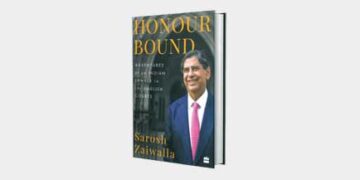Team Blitz India
THE jurisdiction hearing was held before Mr Justice Davies on 25 March 1990. We had instructed the leading libel barrister Charles Grey QC, with Edward Garnier as his junior. (Garnier later became Britain’s solicitor general and on his return to the Bar was instructed in 2016 by Zaiwalla & Co. in another case, when Irina Bokova, secretary general of UNESCO, sued the Daily M ail for libel.’9) Grey argued that with Dagens Nyheter available in London, Ajitabh had jurisdiction to file action in the English court. The Swedish daily was represented by libel litigation specialists Carter- Ruck, who were so well-known in the field that they were regularly mocked for it in the satirical magazine Private Eye. Their lawyers responded that in view of the fact that only a few copies had sold in London, the case should be heard in Sweden. We argued that London was widely recognized as the libel capital of the world, where, contrary to other places, justice was meted out in defamation matters. Therefore, action could be admitted even if a newspaper was not published in Britain. Mr Justice Davies was persuaded by our submission and held that the English court had jurisdiction. Suing in London had proved to be a smart move. I could see Ajitabh was impressed. Our initial success received vast press coverage in India.
Costs of involvement
As I soon discovered, however, this success in the English courts was not without its consequences. Even as I was savouring victory, a new Indian high commissioner arrived in London. The job of high commissioner to the United Kingdom is one of the most coveted in the Indian Foreign Service. When Prime Minister V.P.
Singh came to power, he had appointed Kuldip Nayar, one of India’s best- known journalists, to the London role. Nayar had no love for the Gandhis, having been imprisoned by Rajiv’s mother, Indira, when she imposed the Emergency on the country fifteen years earlier in 1975. This was the only occasion since Indian independence that this provision was invoked. When the new high commissioner arrived, it was normal for me as the mission’s solicitor to make a courtesy call. I was therefore relaxed as I made the short journey from my office on Chancery Lane to India House on Aldwych. On such occasions I always took another person with me, so notes could be kept of any discussions.
Initially the meeting went well. Kuldip Nayar was very friendly. He gave me tea and samosas and we talked for close to an hour. It was only towards the end that he raised concerns that I was acting for the Bachchans. ‘You are a good man/ were his precise words. ‘Everybody respects you. You are working so hard for India. We like you. But why are you acting for those “rogues”?’ as he put it. ‘We like you acting for the Indian high commission. You don’t need them.’ With that his tone got sharper. ‘I will give you seven days to decide whether you want to act for the Bachchans or continue to work for the High Commission of India.’
Clearly, I had not anticipated the foil ramifications of accepting the Bachchans as clients of my firm. At the same time, I was acutely aware that I could ill-afford to fall out with the new high commissioner. Although we had a busy and valuable practice with non-Indian clients, their work (largely involving Greek and Dubai ship owners) tended to be sometimes sporadic.
By contrast, the Indian government was one of our most important long-standing clients, and this had contributed significantly to my firm’s standing in the English legal profession. We had been solicitors for the high commission from 1982, every year handling about seventy to eighty shipping arbitration and other contract cases where the Indian government had accepted English arbitration to determine disputes under contract. I was aware that without this work, Zaiwalla & Co. might well lose its footing in the profession and with that its growing reputation.
I returned from this meeting reeling. The idea that the Indian high commission should dictate to me whom I should have as a client was monstrous. As a man of principle, I knew I should reject Nayar’s ultimatum, but to lose the Indian governments work would be a serious blow. Choosing between the high commission and the Bachchans was one of the most difficult and important decisions I had ever had to make.
The evening after the meeting with the new high commissioner in London, I met Ajitabh and shared my concerns. I expressed my anger but also spelt out what being sacked by the Indian government would mean for my firm. Ajitabh visibly panicked at the thought that I might decide not to work for his family. He said, ‘New Delhi has confidence in you, trusts you and they don’t want anybody else.’ By ‘New Delhi’, I assumed he meant the Gandhis, although he took care never to say so. I told him I had a week to decide and he replied, ‘Leave it with me. I will come back to you tomorrow.’ The next day Ajitabh came to my office as usual and told me he had discussed the situation with ‘New Delhi’, who said my integrity was trusted immensely and that I should say goodbye to the high commission. In return, they would set me up in a business so that I would never have to work again.
This was a stunning offer and I had to think very carefully about the matter. In the end – even though I did not seriously believe Ajitabh would deliver on his promise (more on this later) – I did eventually choose to stick with the Bachchans, but for a different reason. I had accepted instructions from the Bachchans when Rajiv Gandhi was still the prime minister. So, I considered that it would be wrong for me to drop the Bachchans as a client simply because the new regime in India disliked them.
Two or three weeks after our previous meeting the high commissioner asked me to see him again. Over tea and biscuits, I gave him my decision that I would continue to act for the brothers. They had been referred to me by Delhi and I believed it was wrong in principle for the high commission to dictate to me whom I could or could not represent. I said, ‘There is no conflict. An Indian is suing a Swedish newspaper in England. You should in fact be supporting him to clear his name. Why are you instead getting upset?’
Nayar listened to me politely and told me that while it was my decision, it was a bad one. ‘How can you do this to the Indian government?’ he asked me. ‘We have made you here? Years later I met him again at the Delhi residence of Fali Nariman, the eminent senior advocate and my colleague at the International Court of Arbitration in Paris. When we discussed the Bachchan case, Nayar said, ‘I tried to tell you to fudge it? That was simply not true.
Looking back, I know that as a Parsi I have always had some very firm principles. Perhaps then I was even more a man of conviction than I am now; I felt strongly about the issue whatever the fallout.
I returned to my office after our meeting and a week later there arrived a two-line telex from the high commission informing me my firm was no longer the Indian government’s solicitor. At that point we were working on around seventy cases, including for the Central Bureau of Investigation in Delhi, but were told to drop everything, lock, stock and barrel.
I used to be a regular at the high commissions functions. Everyone at India House was friendly and I was treated with respect and a degree of importance. All the invitations stopped. I had taken a very big risk and I knew I had lost my breadand-butter client.
Sometime later the law secretary, Dr P.C. Rao, telephoned me from Delhi saying he regretted the high commissioner’s decision and asked me to continue acting for the Indian government in a major international arbitration my firm was handling for ISRO, the Indian Space Research Organization. ISRO was facing a claim of several hundred million dollars from McDonnell Douglas, an American aerospace manufacturing company, in connection with one of its space satellites, INSAT-1B. This concluded with McDonnell Douglas dropping the claim after the final hearing of international arbitration proceedings had commenced in London.
The following period was a challenging one for Zaiwalla & Co., but we managed with our few other clients.
Ajitabh later encouraged me to sue the Indian high commission as they had stopped paying my overdue fees. He said, ‘Sarosh, you must not let them go, I insist you must collect.’ There was a £353,000 claim, over half of which constituted counsels fees incurred in government cases, which Zaiwalla & Co. was liable to pay.
Ajitabh pushed me to lodge a court claim against the high commission and he paid me £200,000 to cover the cost of doing so. I won the case, recovered my firms fees and in his judgement, Mr Justice Gatehouse expressly mentioned that my ‘conduct was beyond reproach’.
The high commission immediately arranged to pay my outstanding fees after the judgement was obtained from the High Court. There was no appeal. I was expecting this to happen because the law ministry in Delhi had consistently told me whenever I had asked that because the payment of outstanding invoices had become political in India, it was not going to be easy to obtain it unless there was a court judgement. India has a democratic constitution and the majority of cases which clog its courts are those where the government is the defendant.
The battle commences
Meanwhile in the High Court, Bachchans v. Dagens Nyheter gathered speed. On 12 July 1990, we inflicted a significant defeat on the Swedes. The paper had opposed Ajitabh’s application for an order that the hearing be held before the court went into summer recess on 31 July. The papers plea was that the case must be heard in Stockholm first. The court rejected the demand and fixed a dare for commencement of the libel trial.
As we prepared for it, I explained to the Bachchan brothers that libel action works the reverse of most other legal processes. Ajitabh had filed for defamation, but he was not required to prove he had received no kickbacks from Bofors.
On the contrary, under English libel laws Dagens Nyheter had to establish their allegation was true. The paper had a track record of investigative journalism and around that period Swedish media were full of stories exposing illegal arms sales to Eastern Europe, the Middle East, Vietnam and Australia.
But such investigations counted for nothing. Dagens Nyheter would have to come forward and show why their allegations against Ajitabh should be believed. Unlike in the United States, there was no public interest defence in libel in British courts, a law which has since changed. Had there been public interest defence, I would have had to prove the newspaper had written the article out of malice.
The Bachchans would later come up against the greater freedom Americans provide the press, but for the time being, all that was needed was for Ajitabh and Amitabh to take the stand and deny they had received any kickbacks. What they said in the witness box and how they conducted themselves was vital.
I also explained to them that the case would hinge on what the Swedes presented. Their key witness was an Indian journalist, Chitra Subramaniam Duella, then with the Indian daily the Hindu, laterwith the Indian Express and the Statesman.
Chitra had been supplied some 350 documents by Sten Lindstrom, the head of Swedish police who had investigated the Bofors allegations. The documents included payment instructions to banks, open and secret contracts, handwritten notes, minutes of meetings and an explosive diary kept by a Bofors official. Lindstrom had stumbled on them by accident when his team was searching Bofors’s offices and found a set of documents with instructions to Swiss banks that the name of the recipient should be blacked out.
An accountant had asked why anonymity was necessary since the payments were legal. ‘Bofors was unable to explain and then we found more and more documents leading to India,’ Lindstrom later recounted. His decision to turn whistleblower was a result of frustration. He said, ‘I knew what I was doing when I leaked the documents. I could not count on my government, Bofors or the Government of India to get to the bottom of this.’ When the Bachchans’ trial took place, Lindstrom had not revealed that he was the source and so Dagens Nyheter could not call him as a witness.

















